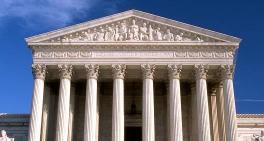Supreme Court brings gavel down on O'Connor workout class
U.S. Supreme Court
Years after she left the Supreme Court, Justice Sandra Day O'Connor remained enthusiastic about the early morning exercise class she started at the highest court in the land — the basketball court that sits one floor above the courtroom where she heard arguments for nearly a quarter-century.
While the first female justice never managed to persuade her fellow justices to join her regularly, her class became a court fixture and a hit with a devoted group of women who live in the court's Capitol Hill neighborhood.
Now, more than 35 years after the class began and more than a decade after O'Connor left the bench, the court has ruled that the women must take their workout somewhere else.
"Unfortunately, the time had come for the class to relocate," Supreme Court spokeswoman Kathleen Arberg wrote in an email to The Associated Press. "Few employees attended the class and for some time now, the Justice has not been a participant and cannot oversee the group's access to the gym, which is in a private area of the building open only to Court employees."
Allowing area residents to attend the class was a "rare exception" to court policy made because of O'Connor's role in the class, Arberg wrote. O'Connor is now 86. Her family was informed of the change, Arberg said.
According to a New York Times article from 1981, the year O'Connor joined the court, O'Connor on her third day at the court sent a notice to all female Supreme Court employees that she was starting an exercise class. The class would meet five mornings a week beginning at 8 a.m. and a YWCA instructor would lead the class, which would cost $35 monthly. The letter said that the class would include "conditioning in slimnastics with some aerobic dance."
In addition to court employees, O'Connor's female clerks were encouraged to join, but others got invites, too. In time there were yearly T-shirts with slogans like "Cool Out with the Supremes."
Until recently, on Monday, Wednesday and Friday there was aerobics and work with weights and resistance bands. Tuesdays was for yoga. Participants often grabbed a post-workout coffee at the court's public cafeteria. These days, the group of about 20 exercisers includes women in their 60s, 70s and 80s, with one participant in her 90s.
Related listings
-
High court limits seizure of assets from drug conspiracies
U.S. Supreme Court 08/03/2017The Supreme Court is limiting the government's ability to seize assets from people who are convicted of drug crimes but receive little of the illegal proceeds.The justices ruled Monday that a Tennessee man convicted for his role selling iodine water ...
-
Trump admin asks Supreme Court to restore travel ban
U.S. Supreme Court 07/30/2017The Trump administration has asked the Supreme Court to restore the ban on travel to the U.S. from citizens of six Muslim-majority countries.Per Reuters: "The administration filed two emergency applications with the nine Court justices seeking to blo...
-
Supreme Court Justice Neil Gorsuch: Rule of law 'a blessing'
U.S. Supreme Court 07/23/2017Supreme Court Justice Neil Gorsuch acknowledged Friday that there is "a lot of skepticism about the rule of law" in the country but defended the United States judicial system as "a blessing" and "a remarkable gift" during a talk at Harvard University...

USCIS to Begin Accepting Applications under the International Entrepreneur Rule
U.S. Citizenship and Immigration Services (USCIS) announced today it is taking steps to implement the International Entrepreneur Rule (IER), in accordance with a recent court decision.
Although the IER was published during the previous administration with an effective date of July 17, 2017, it did not take effect because the Department of Homeland Security (DHS) issued a final rule on July 11, 2017, delaying the IER’s effective date until March 14, 2018. This delay rule was meant to give USCIS time to review the IER and, if necessary, to issue a rule proposing to remove the IER program regulations.
However, a Dec. 1, 2017, ruling from the U.S. District Court for the District of Columbia in National Venture Capital Association v. Duke vacated USCIS’ final rule to delay the effective date. The Dec. 1, 2017, court decision is a result of litigation filed in district court on Sept. 19, 2017, which challenged the delay rule.




